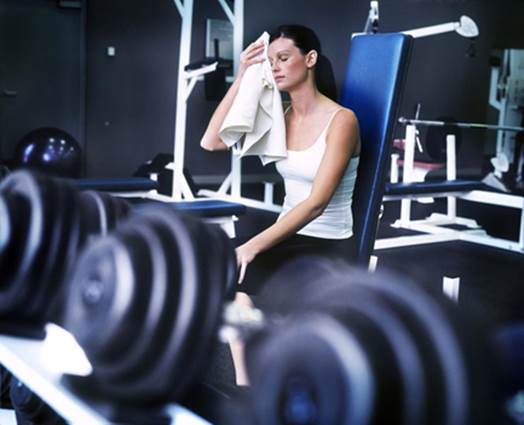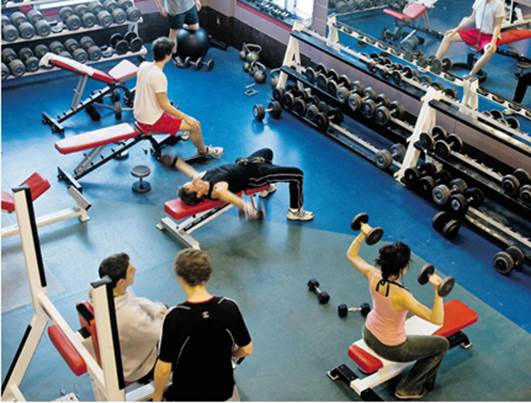if you’re not making gains, you’re
probably not working as hard as you think. We reveal how to turn up the dial to
make every session count
You slog it out at the gym four days a
week, you work up a sweat and you eat well, but you’re still not getting the
results you’re looking for. So, what are you doing wrong? Well, we hate to
break it to you, but you’re probably just not working as hard as you think you
are. It’s a tough pill to swallow, we know, but your gym habits could actually be
working against your fitness goals. Don’t worry; we’ll help you raise your game
for awesome results.

You
slog it out at the gym four days a week
Don’t clock calories
How many times have you been working up a
sweat on the treadmill and thought to yourself, ‘I’ll stop when I get to 300
calories?’ Equating the calorie count on the elliptical trainer with that
270-cal latte might be misleading, and could explain why you’re not seeing the
results you think you should be explains celeb trainer and WF expert Matt
Roberts. ‘Calorie counting on gym machines is just generic. Unless you’re
programming them with personal details such as age and weight, it’s assuming
that a 40-year-old overweight man burns the same number of calories as a
20-year-old active woman working at the same intensity.’
So, if you’re aiming for a 500-calorie
deficit, using the counter on you gym equipment may be misleading. ‘The best
way to get an idea of your body’s working output is to buy a monitor in the
form of a watch’, says Matt. ‘These can hold all your details and track heart
rate, hydration, pace and calorie burn. They’re a great way to track progress
and plan sessions’.
But, even watches can’t be relied on for
accurate results. According to a study by the University of California, machines
overestimate calories burned by around 20 per cent, and watches by almost 30
per cent! They study used a VO2 analyzer to measure the calories used versus
calories recorded.
Lorraine Young, a fitness expert at Les
Mills, says a better way to gauge effort is to set goals. ‘Everyone burns
calories at different rates’, she says. ‘Instead of calories counting, set
goals to work towards. The results will speak for themselves’.

Everyone
burns calories at different rates
‘Everyone burns calories at different
rates, so set goals to work toward instead’
Do adapt your workout
It’s important to keep moving the goalposts
if you want to continue to make progress with your fitness and physique. ‘When
you do the same things every day your body adapts at an astonishing rate’, says
Lee Matthews, head of UK fitness at Fitness First. ‘It’s vital that you change
your routine after around four to six weeks, otherwise you’ll hit a plateau’.
It’s also important to pay attention to
your body’s response to exercise, tuning in to your body’s natural responses is
a better indicator of how hard you’re working than any technology, says
Lorraine. ‘One method of measuring how hard you’re working is the rate of
perceived exertion (RPE), which is based on observing physical sensations
including increased heart rate, respiration or breathing rate, sweating and
muscle fatigue’, she explains. ‘The talk test is another, judged by your
ability to talk during exercise – if you can, then you’re probably working to a
low to moderate pace; if you’re breathless, you’re probably working at a harder
pace.’
Do ditch the distractions
It’s easier to end up breathless if you’re
focused on the task at hand. So leave the magazines in your locker and ditch
the iPhone while you’re on the gym floor and you’ll be much more likely to go
that little bit faster or that bit heavier. ‘Sometimes it is good to switch off
and this would be great if you were in a yoga class during the relaxation
section of the class’, says Gillian Reeves, Virgin Active’s national group
exercise manager. ‘However, if you’re not concentrating on your workout and get
distracted by your phone beeping, you may not be able to push yourself to high
intensities and you’ll probably compromise your technique’. But don’t panic,
that doesn’t mean your Rita Ora playlist is off limits. ‘One exception is
listening to music, which can motivate and inspire you to push harder than you
might do without it’, says Matt.
Can’t trust yourself not to WhatsApp your
friends while on the stepper? Opt for a group exercise class. If you’re
changing the weights on your bar between BodyPump tracks or keeping up with
Zumba choreography, you simply won’t have time to check your Twitter feed!
Don’t compare yourself to others
It’s easy to get sucked into comparing your
body and workout to the girl next to you, but it’s the kind of blunder that
could hold you back. ‘Many people make the mistake of copying others in the gym
to measure their own intensity, which can lead to unexpected results or
injury’, explains Lee. ‘You could also pick up bad habits and ineffective
routines. Remember, other people’s goals may differ from your own’.

Don’t
compare yourself to others
Take a moment to consider the facts: sure,
you may be doing the same number of spin classes as the girl with the awesome
legs, but you don’t have the whole picture. ‘She may have better fitness, an
increased muscle mass or strengths that differ from yours’, says Lee. ‘So, it’s
important to ensure your routine is tailored to you. Start by writing down your
goals and asking a trainer to design the perfect workout to meet them.’
‘Listening to music can inspire you
to push harder’
3 quick ways to work harder
1. Find a gym buddy
Choose someone better than you. Research
show the competitive edge will spur you to work harder for longer
2. Take rest days
Include a light activity such as yoga,
walking or a bike ride on rest days to help your muscles recover.
3. Go high intensity
Interval training will force you to push your body to its absolute
max – and you’ll be done in half the time!